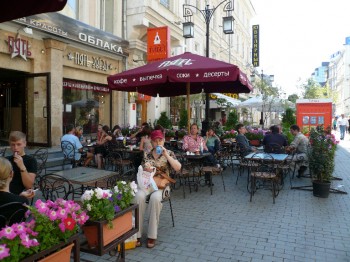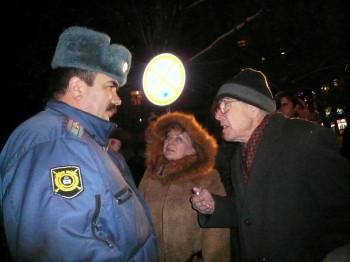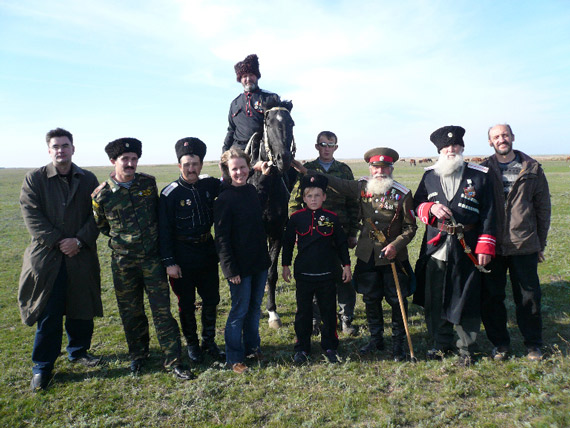Keeping up with the Joneskis
17 April 2009 | Extracts, Non-fiction

Toasting the bride: cheerful wedding parties drive up to the Sparrow Hills in Moscow in summer
Moscow-based journalist Anna-Lena Laurén finds the new Russia a promised land of materialism – a place where appearances are everything, and how you pay for maintaining them is a matter of strictly secondary interest
‘I want to go to the nightclub by boat! Come on, let’s hire one,’ Ilya says, heading towards the shore where a boat for at least twenty people is moored. There are six of us.
After two minutes of negotiation, he takes up his position alongside the gangway. He welcomes us onboard with a chivalrous gesture. We step onto the boat and are gently taken off down the Moyka canal in the white night of St Petersburg in June. The sky is pale pink and dark blue-lilac, the air damp and cold, but the captain hands out rugs to keep us warm. The ornamented bridges and pastel-coloured façades of St Petersburg glide past in a faint glow, it’s just light enough to make out the colours, powdery pink, vanilla yellow, pale blue.
As we pull out into River Neva the wind picks up, we shiver at the same time as we delight in the beauty of it all. Lit up by the night, the mint-green Winter Palace looms majestically alongside the Palace Bridge, and on the opposite shore the golden spire of the Peter and Paul Fortress reaches up against the deep-blue sky. The new fountain by the Strelka is lit up alternately in red, blue and pink, its jets of water dancing in time to classical music.
I turn to Ilya and kiss him on the cheek.
‘Thank you, dear Ilya, for the wonderful boat-trip!’
Ilya doesn’t even answer me, it isn’t the done thing to draw attention to your own generosity in Russia. But I can see from his expression that he’s pleased. Pleased, and proud.
Naturally, Ilya is treating us to the boat-trip, that’s never in any doubt. He is acting as host to me and my guests from Finland, Sweden and Norway, and he wants to show us his city. Suggesting that we should share the cost of the trip would spoil it all for Ilya. A Russian host must be allowed to be generous. The very last thing a guest should do is insist on Nordic social rules, where everyone pays for themselves – something which strikes Russians as incomprehensibly petty.
By the football stadium in Petrogradskaya we make a sudden detour to the shore. Ilya hurries off to a kiosk and returns with a plastic bag full of beer – the only thing missing to make the experience complete. Then we set off along the Neva again, past Krestovskiy Island, out towards the Gulf of Finland. At the point where the Neva stretches out and the Gulf of Finland takes over there is a fashionable yacht-club, complete with open-air disco. Drinks are sold in tents, and along the shore luxurious couches are lined up for you to throw yourself on between dances.
We dance until four in the morning, when the nightclub closes. Then we take a taxi to a tastefully designed Azerbaijani restaurant on Vasilievskiy Island and order Caucasian mezze, Georgian khachapuri bread, and shashlyk, a sort of shish kebab. Ilya takes care of the bill.
Ilya is a successful businessman, which is why he can afford to be so hospitable. He does so the Russian way – with excessive generosity and a supreme sense of unquestionable logic, without giving anyone a chance to protest. As usual, it’s nothing insignificant that we’re being treated to. Private boat-trips in St Petersburg, drinks throughout the evening, and dinner for ten as the finale.
At last I’ve figured out how it works, and no longer try to insist upon contributing. Instead, I thank him loudly and clearly. The next day I say repeatedly what a wonderful time we had, and how marvellously Ilya arranged everything for us. In Russia it is important to say things, to use words, to show your feelings – including appreciation.
If Ilya did not have a share in a thriving business he would not be able to be so generous. But he would still insist upon paying. Paying for others is important, particularly for men. If you have money, it’s important to be lavish with your generosity. It isn’t vulgar to show that you’re rich – on the contrary, it’s part of the deal. Anyone with money has to show it, partly through their lifestyle – material symbols like expensive cars, exclusive watches, designer shoes. But even more important, you need to signal your wealth with your behaviour. Never bother about what anything costs. Don’t even look at price-tags or check the bill in a restaurant. Always leave huge tips regardless of the level of service.
There are exceptions, of course. The filthy rich, like the oligarch Roman Abramovich, for instance, are often photographed in jeans and a leather jacket. He can afford it. Unlike people in the middle class, or even the lower middle class. They have to maintain an image of being better off than they are. Even someone who doesn’t have much money is keen to suggest the opposite.
It irritates me hugely when I take a Russian friend to dinner who is notoriously badly off, only to have him implore me not to leave my tip for the waitress in ten-rouble notes. Because it doesn’t look good. You should leave a a fifty-rouble note at least. Paying the tip in coins is quite unthinkable. It would look terrible, even if the total amount was correct – some ten percent of the bill, in other words.

Cheers: street life has changed radically during the past then years as cafés and restaurants have mushroomed in central Moscow
Generally, the way things look is terribly important in Russia. Your mobile phone is a vital status symbol, even though prices have tumbled and almost everyone can afford one. As a consequence, what matters now is what model you can afford.
My battered old Nokia 6310 phone, the best Nokia model ever made, gets a singularly bemused response – why would a foreign journalist go about with a model that’s over ten years old? The explanation, that the phone has the longest-lasting battery I’ve ever seen in a mobile, is met with complete incomprehension. How the phone performs practically is irrelevant, what matters is the image it conveys about you.
An acquaintance of mine has taken out a bank loan in order to afford the mobile she wants. She is studying to become a cultural administrator, and has a part-time job as a waitress. I’m not sure that this sort of borrowing to fund her spending is the most sensible thing she could be doing given her current circumstances, but I’m the one who doesn’t understand the way things are – Vera is investing in her image. In a city like Moscow, this is far from a waste of money.
A year or so later she and her boyfriend bought a pair of mountain bikes. The most expensive make, of course. Because of this they had to buy the bikes on credit. I say had to, because naturally it isn’t an option to choose a cheaper alternative.
The contraptions are only used once or twice, before Vera realises that Moscow isn’t the ideal city to cycle in. Since then the bikes have languished untouched on a friend’s balcony.
Russia is the promised land of materialism. Most young Russians remember very little about Communism, but it seems as though the thirst for things that didn’t exist before has passed down the generations. Everyone is an expert in brand-names – clothes, shoes, watches, DVD-players, iPods, stereos, flat-screen televisions. When my boyfriend buys me a DVD-player for my thirtieth birthday he proudly brings home a Sony, even though the cheaper Korean and Chinese versions would have been more practical, seeing as they can read pirated DVDs as well. What is mostly available in Moscow are pirated copies, and now it isn’t clear if we’ll be able to watch that sort of film. But this isn’t the issue for my boyfriend, who wants us to have a ‘beautiful’ living room, complete with both a Sony television and a Sony DVD-player.

Protesting: the submissive attitude of citizens towards the authorities is slowly changing. Here Muscovites protest against an unlicensed building being set up next to their house
I’m actually very fond of this Russian generosity. I have learned two things in Russia: an appreciation of being treated to things, and of being the one who treats others. It’s a sort of everyday pleasure that just makes life a bit nicer. It’s fun being treated, or treating others. All of these little proofs of appreciation that you scatter through your daily life make life richer.
This is a pleasure that one is seldom granted in Finland, where the staff in every restaurant know how to keep separate tabs for each member of a party, and where people proffer twenty-cent coins in exchange for a cigarette. This would make Russians faint – even in the middle of a Moscow traffic jam I have seen drivers knock on each others’ windows to cadge a smoke. And so far I have never seen anyone refuse, let alone ask for payment. Everyone knows that it is all likely to even itself out in the long run.
The trouble with these social rules arises when people who can’t afford to be generous are obliged to be. For instance, weddings are anything but cheap in Russia, especially in Moscow where it is expensive both to hire premises and to employ the services of a master of ceremonies for the evening – a wedding tamada, which has been all the rage in recent years. Everyone has to have one, no matter what their personal finances. Everyone has to travel in a Rolls Royce and offer lavish dinners.
A friend of mine in Moscow got married to the boyfriend she had been living with for a couple of years. They each earned less than a thousand dollars a month. Their parents weren’t rich either. But the wedding was excessive, in all the traditional ways – after the ceremony they were picked up by a Rolls Royce and driven around the city all afternoon, followed by a minibus packed full of their friends. This is known as katatsja, meaning roughly ‘pleasure ride’, and is an essential part of a Russian wedding.
In the evening we ate a splendid dinner in a restaurant that they had rent, and we were entertained all evening by a professional master of ceremonies. The happy couple spent the night in a hotel, and the following day we met up in the newlyweds’ home. How they managed to pay for the wedding was revealed – the bridegroom’s father had sold an apartment, the only significant asset the family had.
I didn’t say anything, but I was shocked. Selling good, solid property for the sake of one evening baffles my rational Finnish mind. This is because I am rich, compared to these people. So I just don’t know what it means to find it hard to make ends meet, yet at the same time constantly try to maintain a façade of living normalno, normally. To show that everything is as it should be. Because all normal couples have to be able to afford a Rolls Royce, their own master of ceremonies, and a four-course dinner for thirty people.
What is important is not how things are, but how they look. This means that people don’t realise the true state of things. You simply don’t talk about it. Façades work, as long as you don’t try to look behind them. People have to be allowed to maintain their dignity – they have to be allowed to treat others even though they can’t really afford to.
Russia is a country where people talk about a lot of things that are forbidden in Finland. People talk about salaries, sickness, death. You can discuss existential questions with total strangers. It’s okay to ask people how much they earn. It’s normal to discuss your attitude to God. But you don’t discuss the amount on a restaurant bill.

Cossack hospitality: the author Anna-Lena Laurén (centre, next to the stallion Arzhan) visits the village of Ragul in southern Russia, between the Black and Caspian Seas. The Cossacks were treated badly during Stalin's era, but now they are seen as important symbols of Russian Orthodox culture
From a collection of 16 articles of life in contemporary Russia, ‘De är inte kloka, de där ryssarna.’ Ögonblicksbilder från Ryssland (‘ “They’re crazy, those Russians.” Glimpses of Russia’, Söderströms, 2009. Finnish translation (by Laura Beck), ‘Hulluja nuo venäläiset.’ Tuokiokuvia Venäjältä, Teos, 2008. Photographs: Anna-Lena Laurén)
Translated by Neil Smith
Tags: Russia
3 comments:

21 April 2009 on 9:29 am
Moscow and St Petersburg may be the “promised land of materialism” for a fortunate and cynical few, but I wonder if this book examines the situation further afield in the Russian Federation?
Even before the present economic slump, UNICEF figures showed that some 60 million people in Russia were living in poverty, with those living in rural areas being the most vulnerable and marginalized.
The World Bank recently forecast that this year Russia’s economy will shrink by an estimated 4.5 percent. The drop in the price of oil and the global downturn will have the effect of increasing unemployment throughout the country even further, and the problem of endemic and widespread poverty will grow worse.
I think Anna-Lena Laurén needs to get out a bit more.
30 October 2009 on 6:11 pm
Ms.Lauren certainly captured a lot of signature traits of the Russian public persona. As a Muscovite, I know that selling an apartment to finance a wedding is certainly conceivable, given the “all for show”, “maintain the level” mentality, however, thankfully, it is not that wide-spread a practice. There is a lot of common sense too. Russian people have long been experts at making things go a long way – be it planting potatoes at the dacha and doing preserves for the winter, or upgrading or swapping your apartment to get a better one, etc. Their love for ostentatious consumerism has a lot to do with a maxim nobody in Russia, including, I am certain, Mr. Abramovich, a former “client”of the state orphanage system, can ever forget: enjoy life today, because the opportunity (not the money itself even) might be gone tomorrow and never come back in your life time.
It’s hard to argue with that.
Anna-Maria, Toronto, formerly of Moscow
23 July 2011 on 1:37 am
//I wonder if this book examines the situation further afield in the Russian Federation
outside the capitals the life way is similar, but more comical. you are cool, if you have 10 y.o. honda and unlimited mobile plan